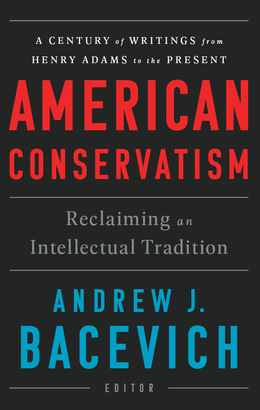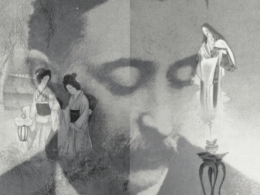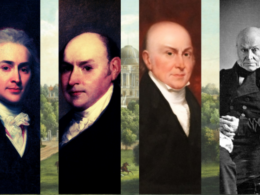Just published by Library of America, American Conservatism: Reclaiming an Intellectual Tradition offers a survey of conservative thought in the United States since 1900, through selections that—in the words of the book’s editor, Andrew J. Bacevich—reveal a tradition “more akin to an ethos or a disposition than a fixed ideology.” The collection’s more than forty contributors include Henry Cabot Lodge, Whittaker Chambers, Zora Neale Hurston, Ronald Reagan, William F. Buckley, Jr., Irving Kristol, Shelby Steele, Joan Didion, and Andrew Sullivan.
Reviewing American Conservatism for the Washington Post earlier this month, critic Tim Page called it a “new and valuable collection” in which “the best articles have a solidity that can seem a bracing tonic for the present chaos.”
Andrew J. Bacevich is a graduate of both the U.S. Military Academy and Princeton University who served in the U.S. Army for twenty-three years. A professor emeritus of history and international relations at Boston University, Bacevich recently co-founded the Quincy Institute for Responsible Statecraft, a think tank dedicated to promoting diplomacy as America’s primary foreign policy tool. His books include The Age of Illusions: How America Squandered Its Cold War Victory (2020) and America’s War for the Greater Middle East (2016) and he has been published in the New York Times, the London Review of Books, and The American Conservative, among other publications. Via email, he answered our questions about his new anthology.
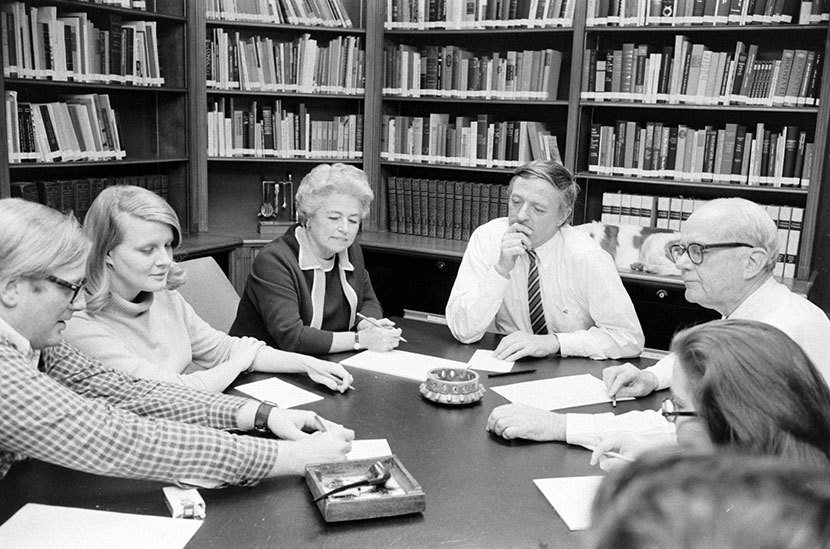
Library of America: Did you set out to adopt a “big tent” approach in putting together this collection? Would some of these contributors be mortified (or amused) to find themselves sharing a Table of Contents with some of the other names represented?
Andrew J. Bacevich: I did try to cast a wide net. Yet I did so pursuant to a specific purpose which was to stake a claim, to wit, that there exists an American conservative intellectual tradition worthy of respect and consideration. My guess is that to most people today conservatism has come to mean the Republican Party of Mitch McConnell and Donald Trump. But in fact the present-day GOP is anything but conservative.
So I chose writers who in my estimation have contributed to that tradition, regardless of how they self-identified. Randolph Bourne was very much a progressive. When other progressives abandoned their principles and heeded Woodrow Wilson’s summons to war in 1917, Bourne stood steadfast. After a flirtation with socialism and pacifism, Reinhold Niebuhr became a hard-nosed liberal. I’m pretty sure he never voted Republican. Yet both Bourne and Niebuhr left a legacy that ought to resonate with principled conservatives today. That’s why I included them in the book.
LOA: Your book is about ideas, and yet the transmission of ideas is bound up with the way they’re expressed. Who are some of the more memorable stylists in your collection?
Bacevich: It took me at least three readings to appreciate the magnificence of The Education of Henry Adams, truly a great book by a profound thinker and a witty writer. So I knew right away that I had to include Adams. I would say much the same about Christopher Lasch—maybe less wit, but enormous passion and relevance to our present moment. My impression is that Whittaker Chambers, another impassioned writer, doesn’t go down well with some readers. But he works for me.
And then there is Charles Beard. If anyone ever writes my obit, it will summarize my life by saying that first, I tried to expose “isolationism” as fraudulent—the United States has never adhered to a policy of isolationism—and, second, I tried to salvage the reputation of Charles Beard as a great historian. Neither effort has come anywhere close to success, but I did want to make a point of including Beard’s voice in this collection.
LOA: Historically most African American intellectuals have not identified themselves with the conservative tradition, and many have felt conservatism to be actively hostile to their interests. And yet there is a strand of African American writing that you’ve included in the book through the figures of Zora Neale Hurston, Shelby Steele, and Glenn Loury. Could you talk about what these writers contribute to the story of American conservatism?
Bacevich: I think it’s fair to say that many non-conservatives today see American conservatism as little more than a bunch of cranky, if not bigoted, white guys who find enjoyment in venting their narrow-minded prejudices in publications that few people read and fewer still take seriously. Sadly, that impression is not entirely without merit.
Yet not without merit is not the same as fully accurate. One of the purposes of this book is to illustrate the diversity of views that fall within the conservative tradition and also the diversity of individuals who have contributed to that tradition.
I happen to be a white male and a one-time professional soldier. From time to time, I’ve gotten the impression that as a former soldier, I’m expected to entertain certain views about matters related national security, for example, favoring high levels of military spending and the vigorous use of U.S. military power. In fact, my views are quite otherwise.
It’s also my impression that similar expectations apply to women, the gay community, and people of color. They are supposed to lean left. But some don’t. They lean whichever way their convictions take them. I wanted this book to make that point.
LOA: If you could induce readers who don’t think of themselves as conservative to sample just a handful of pieces in this collection, which ones would they be, and why?
Bacevich: I’d tell them to read my introduction! Seriously, if someone takes the time to read my introduction and still says, “Nah, not for me,” then what follows is probably not for them. But if that person says, “Okay, now show me,” I’d suggest starting with one of the essays that take aim at the soullessness of the modern capitalist order—Lasch, perhaps, or Robert Nisbet or Patrick Deneen.
LOA: You include only one neoconservative figure, Irving Kristol. Why did you decide to downplay this group’s contribution to conservative thought?
Bacevich: Because they are not conservatives, as I understand and value the tradition. For a brief moment, neoconservatives wielded considerable clout on the American intellectual scene, not as deep thinkers but as skilled polemicists. They were cheerleaders for American Exceptionalism and promoters of American militarism. Their heyday began in 1976 with the election of Jimmy Carter as the first post-Vietnam president and it ended in 2004 or 2005 when the Iraq War that neocons had ardently promoted turned into a disaster.
I do not mean to be disrespectful. Neoconservatives deserve a Library of America volume of their own, in my opinion. But as I faced the challenge of deciding who to leave out—I had page constraints to consider—excluding neocons was a pretty easy call.
LOA: Many, though by no means all, of the writers you’ve assembled have strong religious commitments. Could you talk about the relationship between religious faith (and belonging) to core conservative ideas?
Bacevich: Here my own convictions and perhaps even my own prejudices figure. In his New York Times Book Review review of this book George Will complained about an essay by Richard John Neuhaus that came close to arguing that to be a conservative you have to be a person of faith. That’s not my view.
Yet as a Catholic and a conservative, I do tend to believe that there is an affinity between conservatism and belief in a divinely ordained order. I am not suggesting that progressives are thereby inherently hostile to religion. However, I sense that twenty-first-century American progressives favor the creation of a secular order that carried to its logical conclusion will exclude religion from the public square. Many conservatives, me included, are on the other side of that argument.
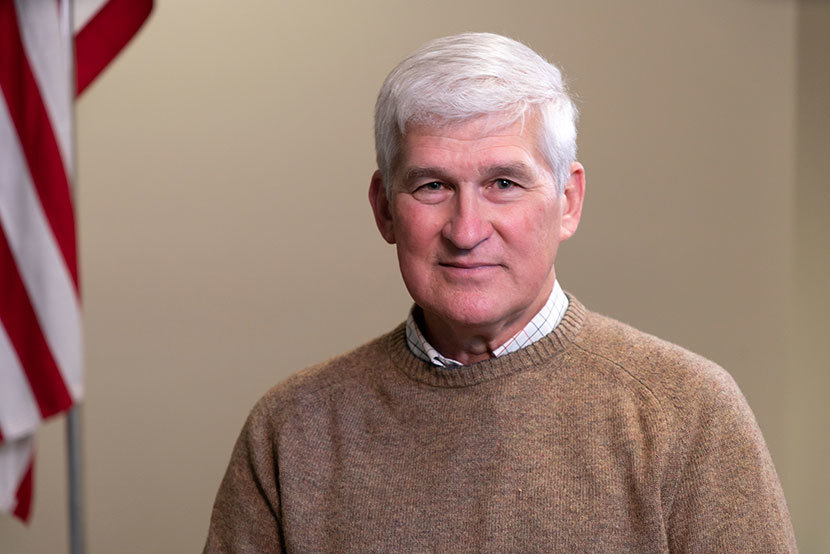
LOA: These writings represent a standard of intellectual discourse that’s in short supply in today’s public sphere. By bringing this collection into print, do you hope to be able to raise the tone of contemporary debate? And are there any younger writers on the scene today who might renew and extend the tradition you’re setting forth here?
Bacevich: Rather than trying to elevate the tone, I am merely trying to widen the aperture of accepted discourse a bit. As for younger writers, I am obliged to admit that my preoccupation with the follies of U.S. foreign policy has narrowed my own reading habits in ways that are not particularly good. I’m also now at the age when I have a harder time remembering names!
That said, I try to keep up with anything written by Ross Douthat, the only Times columnist worth reading regularly, in my view; Dan McCarthy, currently editor of Modern Age; Molly Worthen, a historian at the University of North Carolina at Chapel Hill and a contributor to top-flight general interest publications; Yale’s Samuel Moyn; Stephen Wertheim, a colleague of mine at the Quincy Institute for Responsible Statecraft, and Thomas Meany, a historian currently based in Berlin. I would be remiss if I failed to mention Eugene McCarraher, who teaches at Villanova and whose book The Enchantments of Mammon is a masterful critique of American capitalism and its distorting impact on the American way of life. I am not suggesting that all of these writers are conservative—Gene is certainly not—but I will insist that conservatives have much to learn from them. Actually, not just conservatives: everyone else too.
